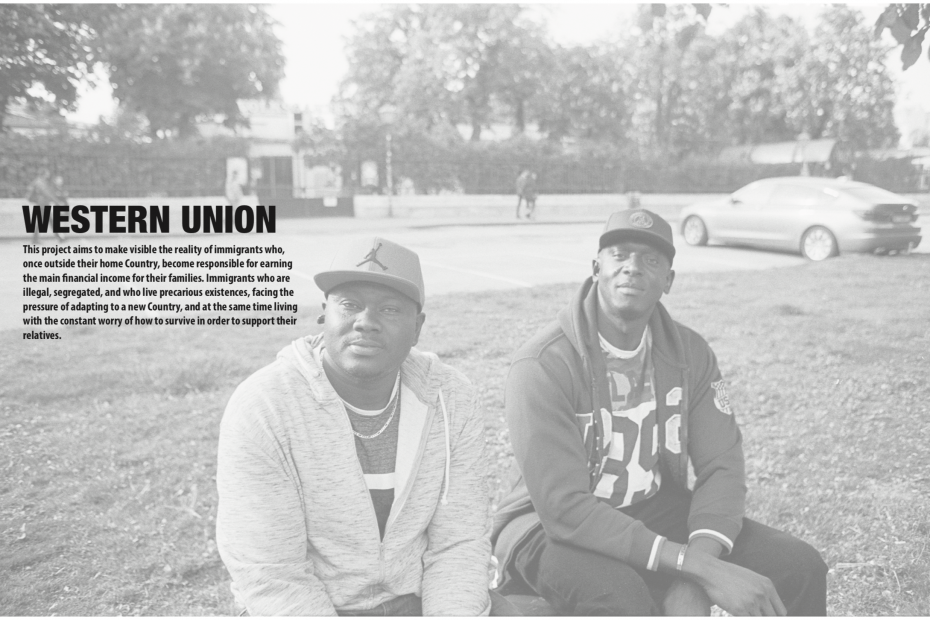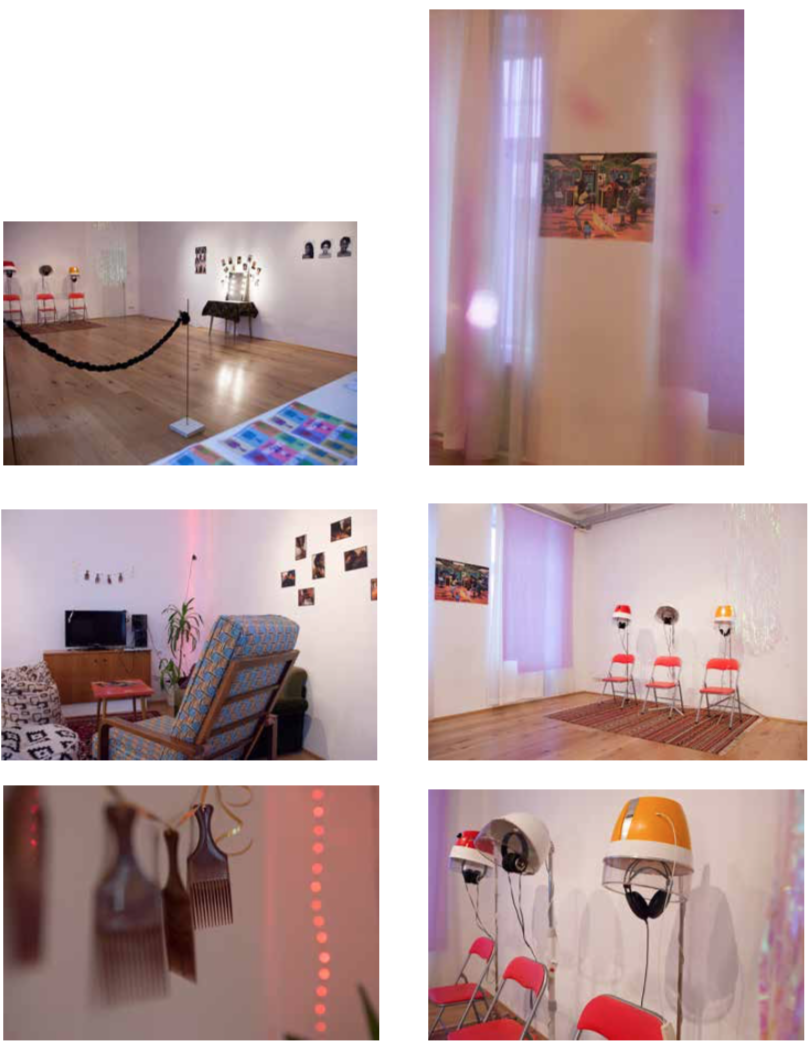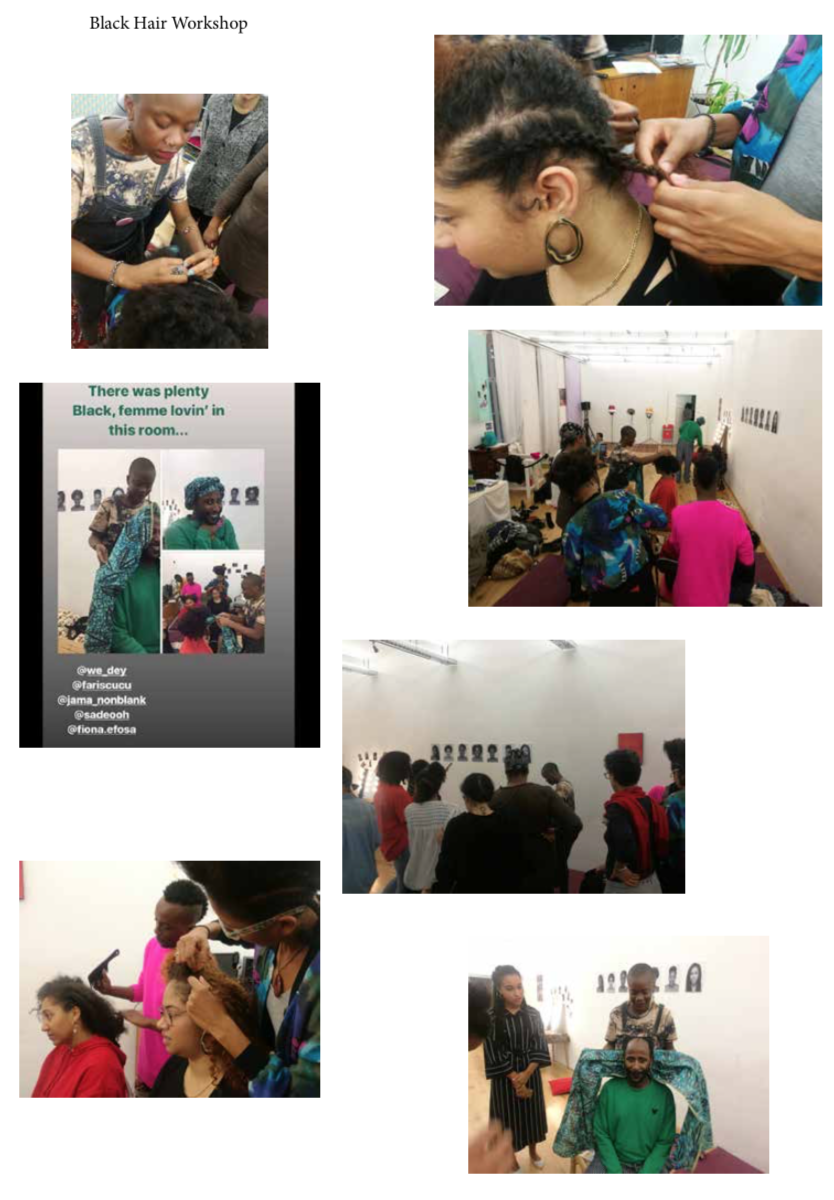WESTERN UNION
by Sattva Giacosa
This project aims to show the ambiguity of the so-called “First World Countries” , and their relationship with Third World Countries, the profitying and exploitation of this hierachie, which criminalises and discriminates against immigrants. In the media, immigrants are shown as people who come to steal work, health care and unemployment money. The underlying reality, which is not only the cheap labour and exploitation they face, but also that the lucrative business behind remittance companies, such as Western Union, banks and currency agencies, remains concealed, even within the realm of alternative and autonomous groups.
It also aims to bring reflection about Western Union offices, as a meeting place and at the same time, a money transaction place, with an abandoned aesthetic almost careless, in which no one really feels comfortable, a strange meeting point, in which many realities converge and share some common ground.
This assessment will be based on interviews and photographs, as well as my own personal experiences. Sending money to Venezuela has become increasingly difficult due to the currency devaluation, caused by the currency control in Venezuela. As a result of this, a black market has emerged where the price of the dollar can go up 100 times more than the official rate.
Following the interview process, in which I will collect examples of different mechanisms for surviving, I want to develop a photo diary portraying their/my experiences and the parallels among the different experiences for each individual. Together with these, I will assemble the pictures with excerpts of the interviews, WhatsApp chats and photographs, presenting both their story and my photographic interpretation.
Screening „Mnemotop“
by Samira Fux
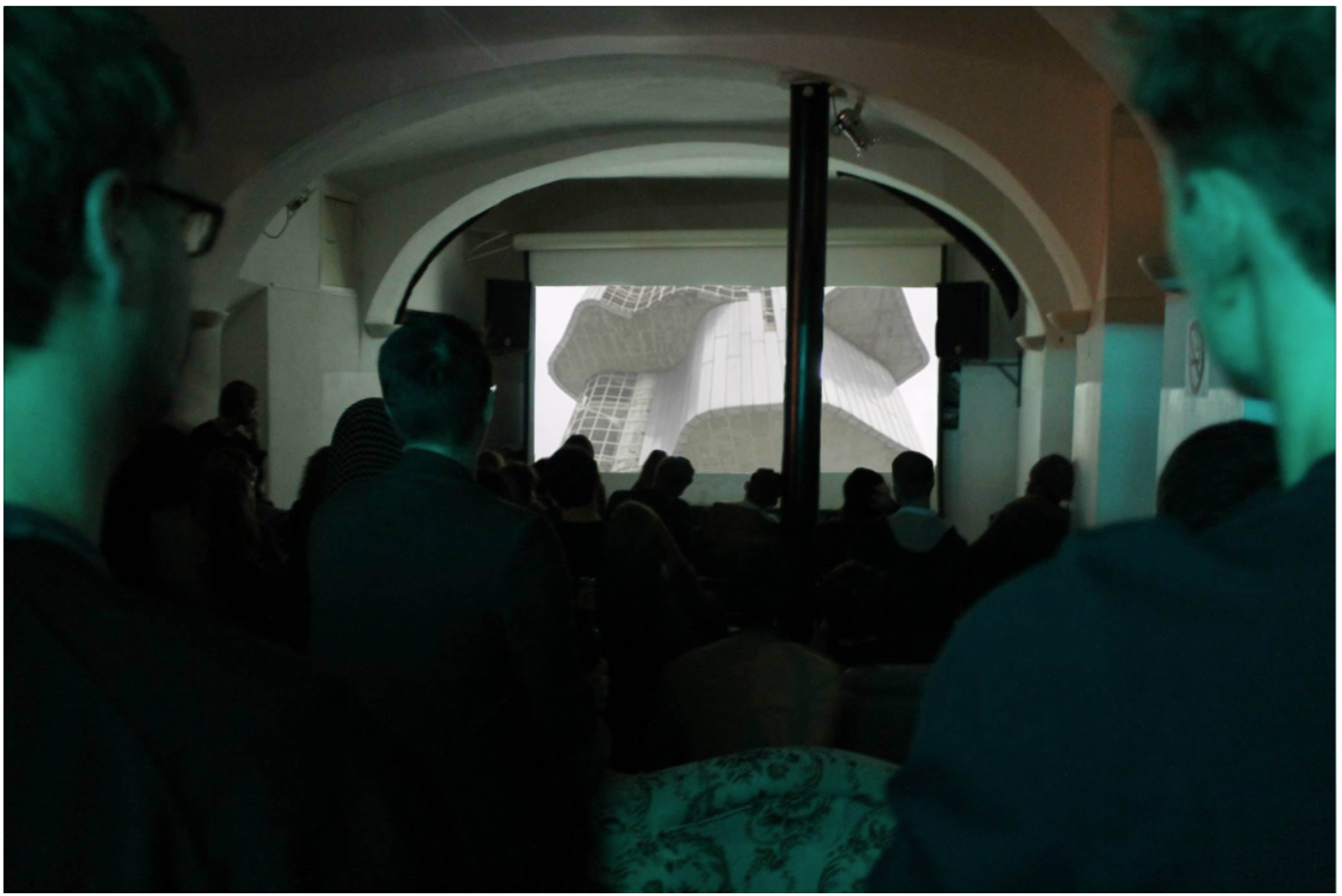
Am 17.Mai fand das Screening von „Mnemotop“ im Klub Slowenischer Student*innen in Wien statt. Wir hatten zwei Referent*innen vom Arbeitskreis Bleiburg/Pliberk eingeladen, inhaltlich zum Thema kroatische Gedenkpolitik und Erinnerungskultur zu sprechen.
Wir haben eine Veranstaltung auf der Facebook-Seite des slowenischen Klubs gemacht und noch privat via Email eingeladen. Da das Treffen der kroatischen Ustascha-Anhänger am Tag nach unserem Screening stattfand, waren wir uns nicht ganz sicher, ob der Termin passend gewählt war, da schon viele Interessierte nach Kärnten abgereist sind, um am nächsten Tag gegen das Treffen zu protestieren. Es kamen im Endeffekt viele Leute, so um die 40, der Raum war voll, zusätzliche Stühle mussten aufgestellt werden.
Zuerst wurde der Film „Mnemotop“ gezeigt um ohne inhaltlichen Input über den Film als solchen sprechen zu können. Nach dem Film begann langsam eine Diskussion, wir erzählten vom Prozess des Filmens. Es wurden viele formale Fragen gestellt und vor allem, wie und warum die drei Erinnerungsorte und –veranstaltungen (Mauthausener Befreiungsfeier, Petrova gora und das Bleiburger Gedenkfeier des Bleiburger Ehrenzuges) nebeneinandergestellt wurden. Eine Frage, die mich bis heute beschäftigt, fragte danach, warum die erläuternden Texte erst nach dem jeweiligen Filmblock eingeblendet wurden. Wir haben dies gemacht, damit die Zuseher*in orientierungslos ist in den ersten Minuten, sie/er soll sich selbstständig versuchen zurechtzufinden – Wo bin ich gerade? Welche Spuren kann ich erkennen, die mir Anhaltspunkte liefern? Das ist jedenfalls aufgegangen. Das Problem ist, dass gewisse Symbole und Zeichen auftauchen, die man kennen muss. Kennt eine Person weder die kroatische Fahne mit ihrem Schachbrettmuster noch das serbisch nationale 4-C Zeichen, so wird diese Person dem roten Faden, der durch den Film läuft, schwerer folgen können. Dadurch wird der Film für inhaltlich vorwissende leichter zu entschlüsseln. Ich habe noch keine Lösung dafür gefunden, wahrscheinlich stößt man immer wieder auf dieses Problem.
Die Referent*innen haben auch mitdiskutiert und teilweise Dinge, die sie in ihrem Input später angesprochen haben, schon vorweg genommen. Als die Diskussion zu inhaltlich wurde, haben wir die Referent*innen nacheinander um ihren Beitrag gebeten. Die Diskussion danach war lebhaft und es hat mich gefreut zahlreiche Exil-Kroat*innen im Publikum zu sehen.
NO DRAMA FESTIVAL
by Lxna Swxllows and Pille-Riin Jaik
‚No Drama Festival‘ is a biweekly podcast that is hosted by Lxna Swxllows and Pille-Riin Jaik in Vienna. It is covering daily relevant and philosophical topics about life as migrants and about art as art students, aiming to give a voice to young generation issues that seem to lack a destined space for reflection. We focus on the untold stories, the stories told wrong and the so-called ‘real life’ behind the ‘art life’. The podcast is held in English (to be more accessible) and is distributed for everyone free on Soundcloud.
ARIBGROUND CREATIONS MARCH-JULY 2019
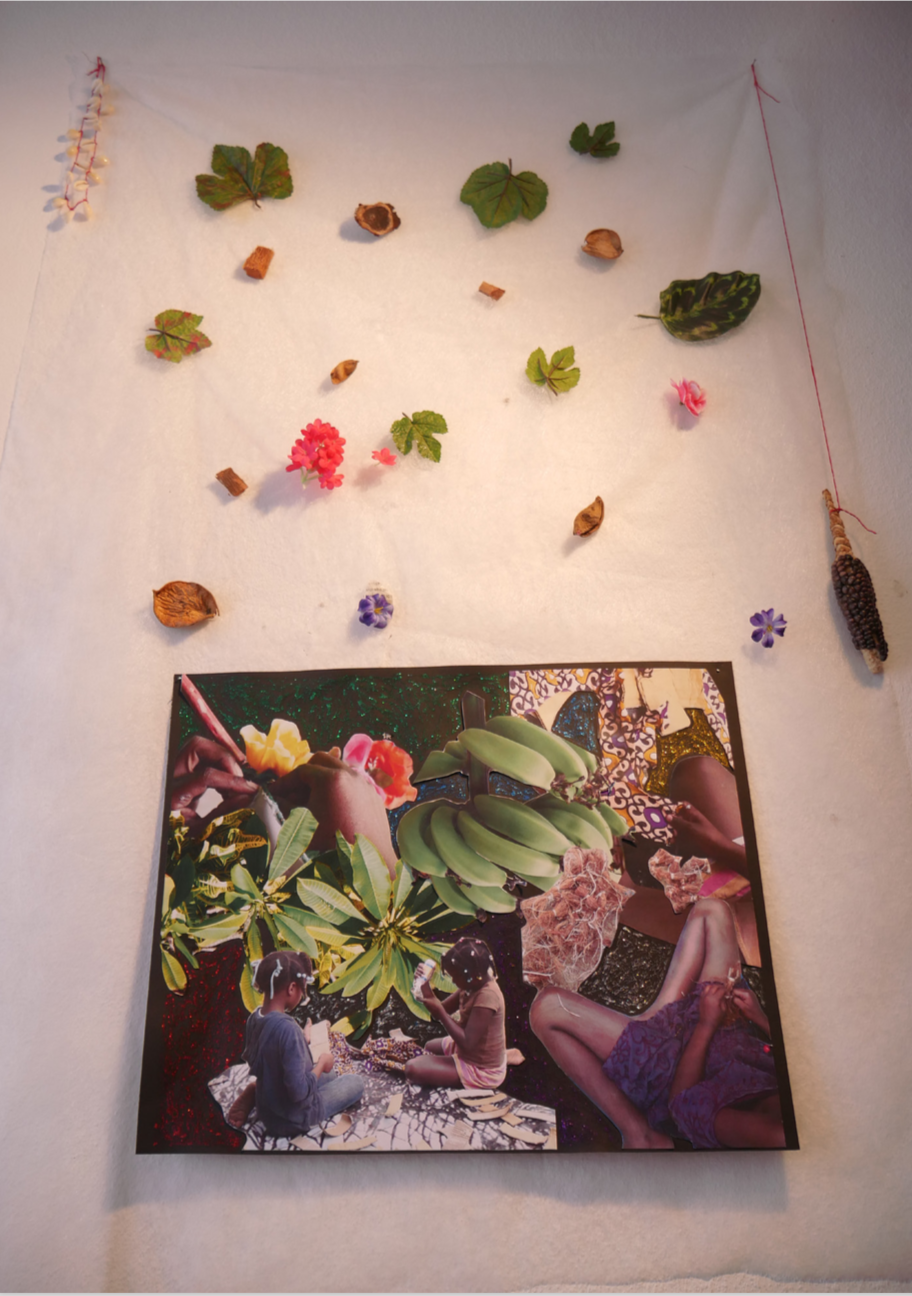 by Lia C. Espinosa & Kalalu Danza Comunidad Los Mercedes
by Lia C. Espinosa & Kalalu Danza Comunidad Los Mercedes
This project was aimed to show the work developed at the school Kalalu where kids from the countryside of the Dominican Republic, developed during February-March 2019 the montage of their local carnival, which particularly enforces the representation of the African traditions present in Haitian-Dominican communities. The work will be related to the exhibition of this process, with the use of images and sound. To obtain this, the aesthetic of the installation is going to be the major topic of creation, since it is the one where I can develop more clear the ideal proposed by Kalalu. For this, and in order to relate to this ground focus of educational methodology, where the context and ambient is in complete relation wit the creative work and it is used as a mean of production, I will use organic materials such as wood sticks, shells, leaves, flowers, stones, looking to create the natural ambient where this community developed their work.
The Kalalu danza school and cultural centre is a space that was created in order to keep artistic traditions of the Afro-Antillan culture and to find new ways: • to confirm the essences of the aesthetics and conceptualization of today‘s black caribbean culture. • to make female entrepreneurs, and artists visible as well as, reinforce their self-recognition as creators • to highligh the actions and characteristics that make the role of a black, feminist, strong and transforming woman in Latin America. • to learn the true story of the African diaspora so to (re)tell afrodescendant new discourses, • to engage in the strategies of resistance and to develop a new conscious that lead to a sincere self-recognition and promotion of the affirmation of a positive identity of the Afrodescendant population. • to promote actions among the Afrodescendant community. to establish an informal education system that supports the dismantling of prejudices promoted by structural racism. The school is built upon the thought that „The Promotion of self-knowledge and recognition from the own artistic or literary expressions is the first step towards the recognition of the afrocommunity.
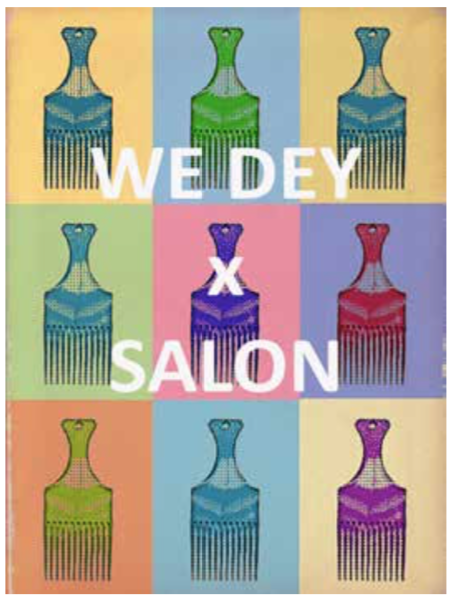
WEDEY X-SALON
by Sunanda Mesquita
Das Projekt WE DEY x Salon dauerte insgesamt 10 Tage. Es
fand in den Räumlichkeiten von dem Verein ko/lab statt. Für das Projekt luden
wir unterschiedliche Künstler*innen ein die einen Bezug zur „Haar Kultur“ von Schwarzen Menschen haben. Das Projekt „WE DEY x SALON“ eröffnete mit einer Ausstellung, mit dem Salon Opening. Während des Openings gab es eine Perfor- mance der Künstlerin Enesi M., nach der Performance gab es ein Live DJ Set von eenyonam von badnboujee. Den
ganzen Abend lang, konnten die Besucher*innen sich Fotografien, Malerei, Vi- deos/Tutorials und Musik ansehen/anhören.
In den nächsten Tagen der Ausstellung war der Salon weiters für einen Black Barber Pop Up, ein Tag der dem Styling der Haare von Schwarzen Menschen gewidmet war, geöffnet. Weiters gab es „Black. Hair. Workshops“ in welchem Schwarzen Menschen der Raum gegeben wurde, sich über ihre eigenen „Hairstorys“ aus- zutauschen, es wurden Tipps und Ratschläge ausgetauscht und diverse Styling-Techniken wie das „braiden“ wurden geübt.
Das Projekt schloss mit einem „Self Care Sunday“ für BPoC Women*/Non-Binary/Trans*/Inter/Femmes ab. Dieser gemein- same Sonntag wurde genutzt um über Selbst-Fürsorge, mentale Gesundheit, persönliche Herausforderungen und vieles mehr zu sprechen und vor allem um gemeinsam zu heilen.
